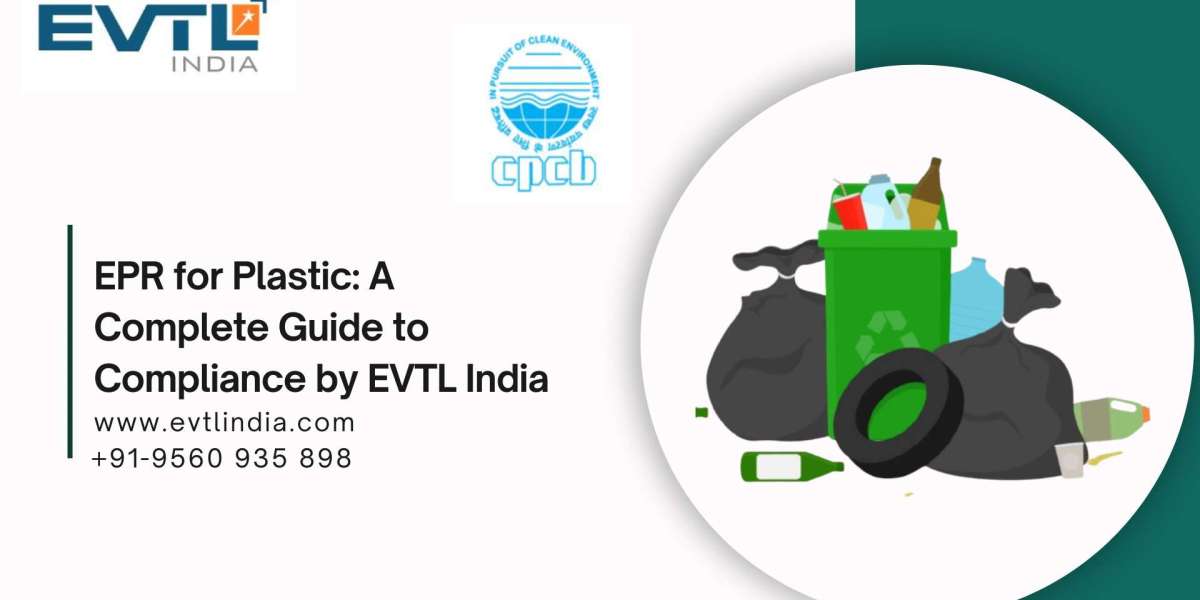In recent years, plastic waste has emerged as one of the most pressing environmental challenges. As governments worldwide work to mitigate the negative impacts of plastic pollution, Extended Producer Responsibility (EPR) for plastic waste has become an essential regulation. In India, the EPR for Plastic framework is designed to hold manufacturers, importers, and brand owners accountable for managing the plastic waste generated by their products. This blog provides a complete guide on how to achieve compliance with EPR for Plastic, with expert tips from EVTL India, a leading Plastic EPR Consultant in the country.
What is EPR for Plastic?
Understanding EPR for Plastic Waste
EPR for Plastic refers to a policy under which producers are responsible for the entire lifecycle of the plastic products they introduce into the market. This includes the collection, recycling, and disposal of plastic waste generated by their products once they are discarded by consumers. The EPR for Plastic Waste regulations in India were introduced to address the growing issue of plastic pollution and to encourage producers to adopt more sustainable practices.
Key Features of EPR for Plastic
- Producer Responsibility: Producers must ensure that plastic waste is collected and properly disposed of after the product is discarded by consumers.
- Collection and Recycling Systems: Producers need to establish systems to collect used plastic products and ensure they are recycled or processed in an environmentally friendly manner.
- Annual Reporting: Producers must submit reports detailing how much plastic waste has been collected and recycled during the year.
- Registration: Businesses must register with the relevant authorities, such as the Central Pollution Control Board (CPCB) or State Pollution Control Boards (SPCB), to be authorized to manage plastic waste.
The Importance of EPR for Plastic Compliance
Environmental Impact Reduction
EPR for Plastic Waste plays a significant role in reducing the harmful environmental impacts of plastic pollution. By ensuring proper collection and recycling, the policy helps prevent plastic from ending up in landfills, rivers, and oceans, where it causes severe environmental damage. The EPR for Plastic regulations encourage the adoption of circular economy practices that reduce the need for new plastic production and minimize waste.
Legal Compliance
Failure to comply with EPR for Plastic regulations can result in heavy fines and penalties. In India, businesses must adhere to these rules to continue selling their plastic products in the market. EPR for Plastic Waste compliance ensures that businesses meet legal obligations and avoid legal repercussions that may hinder their operations.
Enhancing Brand Image
Complying with EPR for Plastic also benefits businesses in terms of their corporate social responsibility (CSR). Consumers are increasingly concerned about the environmental impact of the products they purchase. By adhering to EPR for Plastic Waste regulations, businesses demonstrate their commitment to sustainability, which can improve their brand image and attract eco-conscious customers.
How to Achieve EPR for Plastic Compliance with EVTL India
Step 1: Register with the CPCB or SPCB
The first step in achieving EPR for Plastic compliance is to register with the Central Pollution Control Board (CPCB) or the relevant State Pollution Control Board (SPCB). This is a mandatory requirement for all businesses involved in the production or import of plastic products.
As a leading Plastic EPR Consultant, EVTL India assists businesses in completing the registration process. We ensure that the application is submitted with all necessary documents, such as details of the plastic products, quantity, and the intended collection and recycling mechanisms.
Step 2: Develop a Plastic Waste Management Plan
Once registered, businesses are required to develop a comprehensive plastic waste management plan. The plan should include the following:
- Collection Mechanisms: Establishing collection centers or take-back systems to gather used plastic products from consumers.
- Recycling Systems: Partnering with certified recyclers to ensure that plastic waste is processed in an environmentally responsible manner.
- Disposal: Ensuring that non-recyclable plastic waste is disposed of properly, in compliance with environmental standards.
EVTL India works closely with businesses to create a tailored EPR for Plastic Waste management plan that fits their needs and meets regulatory requirements.
Step 3: Implement a Take-Back System
One of the key components of EPR for Plastic is the establishment of a take-back system. Producers must provide consumers with an easy way to return used plastic products for recycling. This could be in the form of physical drop-off points, online take-back programs, or collaboration with retailers for collection.
As an experienced Plastic EPR Consultant, EVTL India helps businesses design and implement efficient take-back systems that are compliant with the guidelines for EPR for Plastic Waste.
Step 4: Set Up Recycling Partnerships
In order to meet EPR for Plastic regulations, businesses must ensure that the collected plastic is sent to certified recycling facilities. These facilities process the plastic into reusable materials that can be incorporated into new products, helping to reduce the need for virgin plastic.
EVTL India assists businesses in identifying and establishing partnerships with certified plastic recyclers, ensuring that the recycling process is in line with EPR for Plastic Waste requirements.
Step 5: Submit Annual Reports
Under the EPR for Plastic Waste regulations, businesses are required to submit annual reports detailing the amount of plastic waste collected, recycled, and disposed of. These reports must be submitted to the CPCB or SPCB to demonstrate compliance.
EVTL India provides support in preparing and submitting these reports, ensuring accuracy and timely submission, helping businesses maintain compliance with EPR for Plastic regulations.
Step 6: Ongoing Monitoring and Compliance
Compliance with EPR for Plastic Waste is not a one-time process. Producers must continually monitor their plastic waste management systems to ensure they are meeting the required collection and recycling targets.
EVTL India offers ongoing compliance support, conducting regular audits and assessments to ensure that your business remains in full compliance with EPR for Plastic regulations.
Why Choose EVTL India as Your Plastic EPR Consultant?
Expertise and Experience
EVTL India has extensive experience in helping businesses navigate the complexities of EPR for Plastic regulations. Our team of experts provides tailored advice and solutions to ensure that your business meets all compliance requirements efficiently.
End-to-End Support
From registration with the authorities to ongoing compliance monitoring, EVTL India offers end-to-end support for businesses seeking EPR for Plastic Waste compliance. We handle all aspects of the process, allowing you to focus on your core business operations.
Customized Solutions
Every business has unique requirements when it comes to EPR for Plastic. EVTL India offers customized solutions designed to meet the specific needs of your business, whether you're a small producer or a large importer.
Cost-Effective Solutions
We understand that managing EPR for Plastic compliance can be resource-intensive. EVTL India offers cost-effective solutions that help businesses streamline their plastic waste management systems without compromising on quality or compliance.
The Benefits of Complying with EPR for Plastic
1. Environmental Protection
By complying with EPR for Plastic, businesses contribute to reducing plastic pollution, protecting the environment and promoting sustainable practices.
2. Legal Protection
Adhering to EPR for Plastic Waste regulations ensures that businesses avoid penalties and maintain their ability to operate in the market.
3. Enhanced Brand Reputation
Consumers are increasingly focused on sustainability. By demonstrating your commitment to managing plastic waste responsibly, you can build a positive brand reputation and attract eco-conscious customers.
4. Participation in the Circular Economy
Complying with EPR for Plastic supports the circular economy by ensuring that plastic waste is recycled and reused, reducing the need for new raw materials and conserving resources.
Conclusion
Compliance with EPR for Plastic Waste is no longer optional for businesses that produce or import plastic products in India. EVTL India offers comprehensive guidance to ensure that your business meets all EPR for Plastic requirements, from registration to ongoing compliance. As a trusted Plastic EPR Consultant, we provide expert advice, customized solutions, and end-to-end support to help businesses achieve their sustainability goals and contribute to the global fight against plastic pollution. Partner with EVTL India today to ensure your EPR for Plastic compliance and make a positive impact on the environment.








